Entries from August 2006 ↓
August 30th, 2006 — Research, Trivia, TV
After reading a recent Slashdot article about a Star Trek Ph.D. thesis winning an academic prize, I wondered how many other theses involve Star Trek. According to Digital Dissertations, the answer is no less than fourteen! Here’s the list so far, from oldest to most recent:
And this list includes only Ph.D. dissertations in English that have the phrase “Star Trek†in the title. I’m sure there are many more theses that involve Star Trek in some peripheral way, not to mention journal articles, conference papers, and non-English publications.
As a Star Trek fan, I’m rather pleased that my favorite sci-fi franchise is considered worthy of serious academic study.
August 23rd, 2006 — Games, Personal, Software
This summer I’ve gotten into the habit of playing Warcraft III online. Unlike certain other online games that are all the rage these days, WC3 isn’t a timesink. Games only last about twenty minutes on average, and they’re self-contained, so you don’t feel like you have to keep playing to build up your character’s experience points or inventory or whatever.
My favorite format is the three-on-three pick-up game, in which the server selects six random people and forms them into two ad hoc teams. One such game was a bit more interesting than most, so I saved it as a replay. (You can play it back if you happen to own a copy of Warcraft III.) Here’s a play-by-play:
11:30 The opposing team masses an army of Level 2 units and rushes Orange.
14:15 Orange’s base is toast, and Teal delcares his team the winner. Orange gives up and leaves the game. It’s over! …or is it?
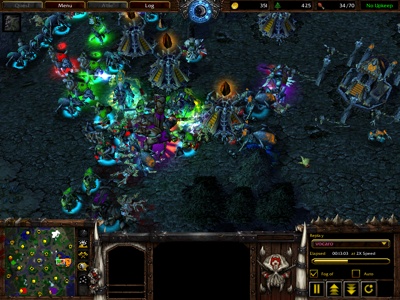
Orange faces destruction.
17:00 The opposing team now sets their sights on me. Purple advises that I retreat to his base, so I teleport there.
18:00 As my base is being destroyed, Purple and I counter-attack Red.
20:00 Caught off-guard, the opposing team tries to defend Red, but it’s too late. Red is annhilated, leaving Green and Teal. Armed only with Purple’s base and my five Chimeras, is victory possible?
20:30 I send my Chimeras for an end run around the back of Green’s base. He has no AA, so the Chims destroy his base easily. Only Teal remains!
22:30 My Chimeras make another end run, this time to the back of Teal’s base, destroying his gold mine.
27:00 Teal and Green attack us in a last-ditch effort, sending everything they’ve got. It’s a battle for the center!
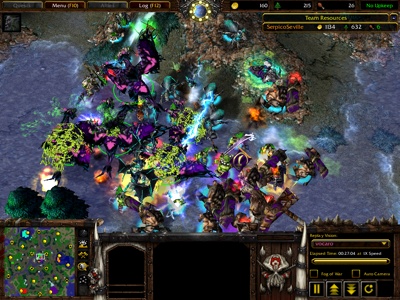
It’s a battle for the center!
27:30 The opposing team’s Level 2 units are no match for our Level 3 Chimeras and Tauren! Green and Red give up.
28:00 Teal, deprived of gold by my Chimeras, has no units and admits defeat.
28:18 Victory! What a comeback!
August 17th, 2006 — Mac, Rants, Research, Software
My colleagues and I were finally able to publish our Autonet research at a conference in Chicago. Being the lead author, I hopped on a flight to the Windy City last Tuesday to present the results of our work. When I arrived at the hotel, I met the other two speakers scheduled for the afternoon session. The first one was busy setting up his Dell at the podium while the audience slowly began to fill the room. The second speaker had no laptop, only a USB drive with his slides; he was hoping to borrow the first speaker’s Dell.
We were about two minutes away from showtime when the projection screen suddenly froze. Here’s what everyone in the audience saw:
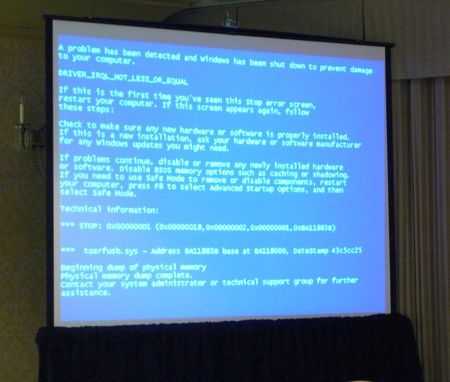
It turned out that the guy’s Dell was crashing whenever he tried to start his PowerPoint presentation. Rebooting didn’t help. Windows insisted on giving him the Blue Screen of Death.
By this time, we were now late. Frustrated, the two speakers saw me typing on my Mac and asked if I could help. I walked up to the podium, plugged my Mac into the projector, loaded both of their presentations into Keynote, and returned to my seat. The first speaker then began his presentation using my PowerBook. Then the second speaker. Then me.
No BSoD. No crashing. It just worked. My Mac saved the day!
Hmm, that reminds me of an ad…

August 12th, 2006 — Personal, Software
I’m a regular reader of Dr. Dobb’s Journal, a monthly magazine covering the world of software development. One of my favorite columns in Dr. Dobb’s is “Nisley’s Notebook†because it mainly deals with my favorite topic: embedded systems. You can imagine my surprise, then, when I reached the end of the July 2006 column and saw my name:
Speaking of Windows ME, alert reader Trevor Harmon reminds me that it still allowed direct, user-mode I/O port control. Read more on FAT and the Microsoft patents at en.wikipedia.org/wiki/File_Allocation_Table.
I read that paragraph several times, thinking there must be some other Trevor Harmon who reads Dr. Dobb’s and had written to Ed Nisley. Then I suddenly remembered: I had, in fact, emailed Ed some time ago about his April 2006 column. Here’s how it went down:
In your April article in Dr. Dobb’s Journal called “Tight Code,†you state:
“The notion of a user program directly controlling an I/O port pretty much died with Windows 98.â€
Why Windows 98? I thought it was architecturally almost identical to Windows 95. Was there some significant difference in the Windows API that I’m not aware of? In any case, I thought direct control of an I/O port died much earlier, way back in the 1970s with the advent of UNIX and its abstraction of I/O hardware as a /dev file.
Thank you,
Trevor
To which Ed replied:
Direct I/O control died -with- Win98: that was the last Windows flavor allowing that sort of thing. WinME sorta-kinda did, too, but MS was revamping the driver model and (IIRC) discouraged using the Olde Versions.
Or maybe I just have a picket-fence error…
Indeed, the various Unix-oid systems did bring protected hardware to the university level, but the vast bulk of Windows boxes pretty much overshadowed all that. As far as the mass market goes, programmers were doing direct I/O from DOS right up through Win98 (or ME?), at which point everything they thought they knew went wrong.
Ed
I responded:
Ah, I read that as “was killed by Win98â€, as if Microsoft had developed some revolutionary product that nullified anyone’s desire for direct hardware access.
Yes, I believe ME, not 98, was actually the last Windows version to support direct hardware access. That’s one of the main reasons I was confused: It was the NT kernel, not Win98, that changed things in the Microsoft world.
Also, you used the word “notion,†and I would say that the notion died long before Windows ME even existed. Nobody (except maybe for game developers) supported the notion of direct hardware access, even though it continued to exist in legacy operating systems like Windows 9x. So I was doubly confused.
Trevor
And Ed concluded with:
Part of the job here is to write so that sort of thing doesn’t happen… I’ll drop a correction in the bitstream for the next column.
Thanks for keeping me straight!
Ed
So, this other “Trevor Harmon†mentioned in the column was me after all! I had completely forgotten about my conversation with Ed. Although I’ve published in Dr. Dobb’s before, it was still fun to see my name in print, especially in such an unexpected way.
August 9th, 2006 — Research
San Diego is the home to an elaborate research facility run by the U.S. Navy. Known as the Space and Naval Warfare Systems Center, it sponsors a yearly contest for university students. The challenge? Build a robot that can travel underwater and, without any human control, perform a series of tasks (a pipeline inspection, for example) within a given time limit.
Each year, teams of undergraduates come from around the world to showcase their designs for an autonomous underwater vehicle, or AUV, as they are called. The idea is to get students interested in the field of unmanned robotics and teach them what it’s like to be involved in a start-up venture. (Each team must provide its own funding for the contest.)
I had only learned about this AUV contest recently, even though I actually visited the center about two years ago. (My research group had been holding talks with the scientists there to discuss the possibility of collaborating on a project.) Because robotics is a field I’m increasingly interested in, I decided to visit the center on the last day of the contest, when the finals were being held, to see what it was all about and maybe catch a glimpse of some cool bots.
Unfortunately, there wasn’t much to see. Most of the action was hidden in the depths of this large murky pool.
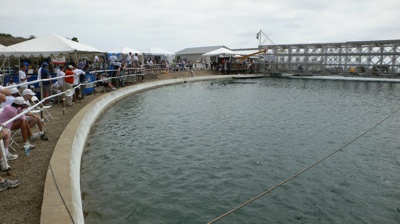
Here’s a wide shot so you can get a feel for the size of the pool. On the left, you can see the large orange crane that was used for lowering the AUVs into the water.
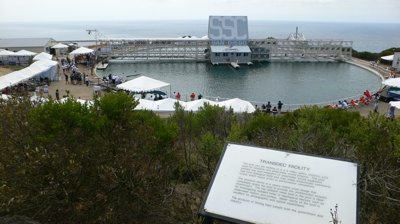
As you can probably tell, there wasn’t much to look at. Even when an AUV was making a run, you couldn’t see what was going on, so it was kind of boring for spectators. Of course, the participants not lucky enough to make it to the finals didn’t have much to do, either. (I saw one team in a tent in the back playing cards with each other.)
Perhaps the most interesting moments were when a robot failed and had to be returned manually by the two divers shown here. A common occurrence, strangely enough, was that a robot would be released and then suddenly sink right to the bottom! I wasn’t sure if this was due to buoyancy problems or software problems.
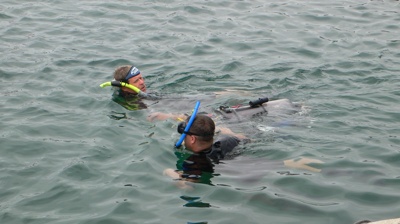
All in all, I was glad I was able to witness the event, even though I didn’t stay long. I spent the rest of the day with my wife at San Diego’s other watery attraction.
Later, I found out from Slashdot that the University of Florida came away with the win.
August 3rd, 2006 — Ghana
As a Returned Peace Corps Volunteer (RPCV), I like to keep up with the Peace Corps Ghana community. One of the best ways of doing that, I’ve found, is through a Peace Corps Ghana mailing list, which currently has around 250 members. Sometimes RPCVs will use the list to exchange anecdotes or try to find old friends they’ve lost touch with. Mostly, though, the traffic comes from people who’ve just received their service invitation and have questions about what to pack, what to wear, and so on.
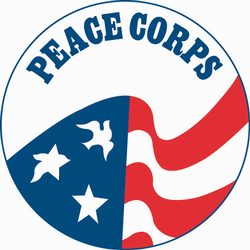
Some time ago, I realized that the same questions were being asked on the list over and over again. (“What should I pack?†is the perennial favorite.) The RPCVs on the list want to help, but it’s not fun going through the same Q and A routine for each new batch of volunteers. And it’s not so great for those who post the questions, either: Helpful advice might not come up in every new discussion, either because old knowledge is forgotten or because people simply don’t have time to mention all of their tips. Of course, there’s an archive of old messages, but searching through them to find answers is tedious and time-consuming.
Seems to me that new Peace Corps volunteers would love to have a single source for this collective wisdom, and RPCVs would love to stop repeating themselves, so I decided to kill two birds with one stone by creating a FAQ. The idea was to capture the most up-to-date information about Peace Corps Ghana. It would be a repository of helpful tips that any new volunteer should know but won’t find on the official Peace Corps website. (Examples: Is it wise to bring along my iPod? How do I mail myself something? Is it okay for men to have long hair?)
To make sure this FAQ would represent the combined knowledge of RPCVs, and not one man’s opinion, I set it up as a wiki that could be edited or expanded by anyone. And as a wiki, the FAQ would become a “living†document, never going out of date. (Theoretically, at least.)
In addition to the FAQ, I also added some poignant anecdotes written by Ghana RPCVs, as well as links to other websites related to Peace Corps Ghana. Having gone to all that trouble already, I thought, “Why limit this wiki to the Peace Corps? Why not make it for everything Ghana?â€

And that’s exactly what I did. I even registered its own domain name: ghanawiki.info. I started it off with a few brief articles on cheap flights to Ghana and how to get Ghanaian radio and TV over the Internet.
Hopefully, other Ghanaphiles will soon discover the wiki and help me create new articles and add more content to the existing ones. With luck, it may one day reach “critical mass†and become a key source of information for Peace Corps Ghana volunteers or anyone else wanting to learn more about the Ghana experience.








